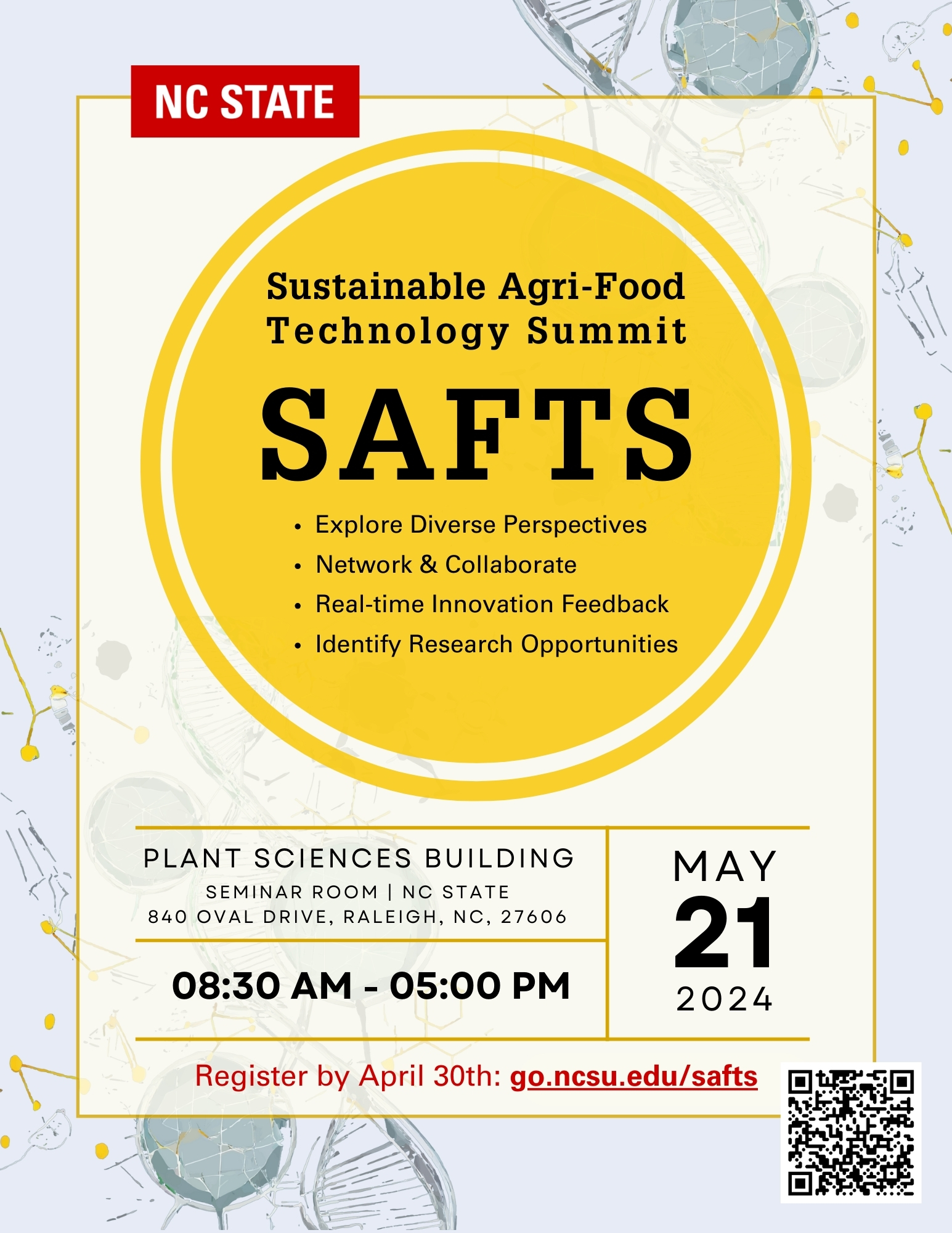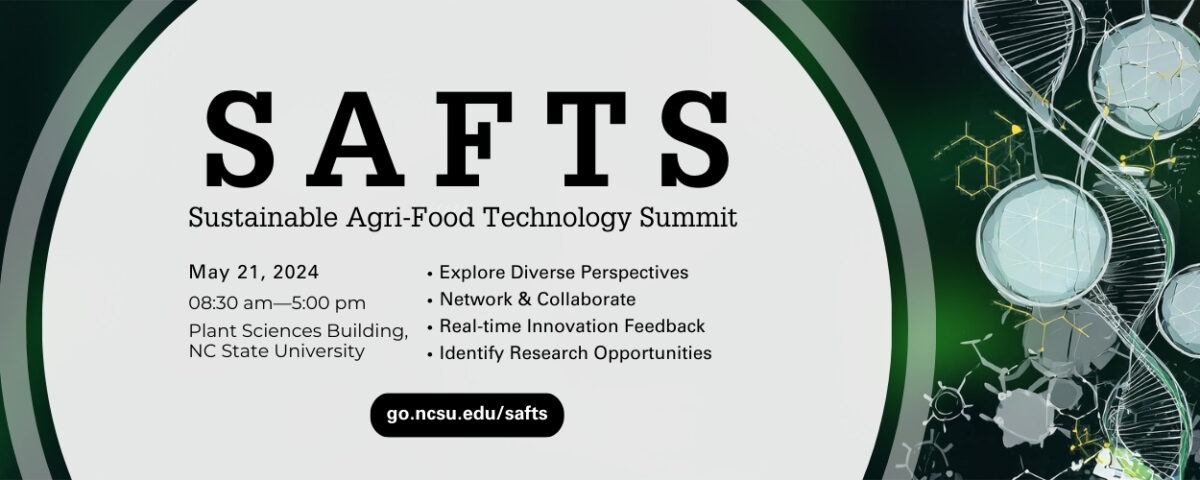Sustainable Agri-Food Technology Summit
May 21, 2024, NC State Plant Sciences Building | USDA-NIFA Funded Workshop
REGISTRATION CLOSED
About
Join us at the Sustainable Agri-Food Technology Summit (SAFTS) on May 21, 2024, as we delve into the forefront of agri-food technology sustainability, fostering collaboration and dialogue among diverse stakeholders.
Download SAFTS Agenda
Download full-sized SAFTS flyers: light version >; dark version >
Addressing Global Food Challenges
With the world population projected to reach 10 billion by 2050, demanding a 50% increase in global food production and a 70% growth in nutrient-dense foods, agri-food systems are at a pivotal juncture (Searchinger et al., 2019; The World Bank, 2007). Balancing this demand with environmental sustainability is crucial, as agri-food systems contribute significantly to global greenhouse gas emissions (Lynch et al., 2021). In response, new and novel agri-food technologies offer promising solutions, presenting opportunities for abundant, nutrient-sufficient foods without compromising the planet’s health.
Exploring Sustainable Solutions
The SAFTS workshop, led by researchers at North Carolina State University, aims to deepen our understanding of “sustainability” in food systems. Through a multi-stakeholder approach, the summit will bring together scientists, industry experts, advocates, and policymakers to explore diverse perspectives on sustainability, share real-world innovations, and identify collaborative opportunities for the future.
Keynote and Spotlight Presentations
The summit will feature keynote and spotlight presentations from experts covering emerging areas of sustainable agri-food technology development. Topics include gene-edited fruits and vegetables, genetically engineered microbes for livestock, and cell-cultured meat as alternative protein sources. Participants can engage in real-time feedback sessions, contributing to responsible research and innovation in the agri-food technology industry.
Stakeholder Engagement and Collaboration
SAFTS is designed to be a collaborative “incubator,” fostering dialogue and consensus-building. Roundtable discussions will unpack the meaning of sustainability, and real-world agri-food technologies will be showcased for immediate participant feedback. This dynamic environment aims to build bridges between diverse perspectives and catalyze impactful collaborations.
Disseminating Insights
The outcomes of SAFTS will be disseminated through peer-reviewed publications and upcoming seminars, further contributing to defining sustainable agri-food technologies, fostering ongoing engagement, and inspiring future research initiatives. SAFTS is not just a workshop; it’s a catalyst for positive change in the agri-food technology landscape based on diverse stakeholder engagement.
Speakers
SAFTS will feature speakers with expertise in diverse topics such as new technologies in food and agriculture, gene editing with CRISPR, societal implications, risk analysis, plant-based foods and alternative proteins, and innovative approaches to address climate change through genetic engineering.
| Speaker | ||||||||||||||
|---|---|---|---|---|---|---|---|---|---|---|---|---|---|---|
| Bill Aimutus | Keynote Speaker (9:10–9:40 AM) | Aimutus | 01 | Bill Aimutus has led the NCFIL since it was a mere seedling of a facility in 2018. One of the most experienced food scientists in the country, he has held several research and operations leadership and management positions for companies such as Cargill, Inc., Land O’Lakes and Kerry Ingredients. An Indiana native, Bill received a Bachelor of Science degree in Food Science at Purdue University and graduate degrees from Virginia Polytechnic Institute and State University in the Food Science Department. He is an IFT Fellow, a Fellow of the American Dairy Science Association and a Distinguished Agricultural Alumnus from both Virginia Tech and Purdue University. Bill also serves on industry advisory committees for Agricultural Engineering (Penn State University), Food Science (Virginia Tech University), the Agriculture Innovation Forum (Larta), and the University of Illinois’ Integrated Bioprocessing Research Laboratory. | Innovations in sustainable agri-food systems | https://ges.research.ncsu.edu/wp-content/uploads/2024/03/Bill-Aitumus_400x400.jpg | Executive Director | North Carolina Food Innovation Lab | https://www.ncfoodinnovationlab.org/bill-aimutis | bill_aimutis@ncsu.edu | ||||
| Kathryn Polkoff | Spotlight Presentations (12:45–2:15 PM) | Polkoff | 02 | Dr. Kathryn Polkoff is co-founder and CEO at Hoofprint Biome, a North Carolina-based startup which is engineering probiotics that eliminate methane from cattle while improving animal digestion efficiency. Dr. Polkoff has spent her career at the intersection of livestock production and biotechnology. At Hoofprint, she has secured funding from multiple government and philanthropic organizations, and has closed a multi-million dollar round of venture capital financing. She holds a B.S. and M.S. in Animal Science from the University of Illinois and a PhD in Comparative Biomedical Sciences from NC State’s College of Veterinary Medicine. | GE microbes for reduced methane emissions in cows | https://ges.research.ncsu.edu/wp-content/uploads/2024/03/Kathryn-Polkoff_400x400.jpg | Co-Founder and CEO | Hoofprint Biome | https://www.hoofprintbiome.com/ | hello@hoofprintbiome.com | ||||
| Megan Thomas | Spotlight Presentations (12:45–2:15 PM) | Thomas | 03 | Megan Thomas is the Founder & CEO of Ladder17, a purpose-driven marketing consulting firm focused on growth and late-stage startups. Megan was formerly the Vice President, Marketing and Communications for Durham-based Pairwise, where she led marketing, brand, consumer research, and communications strategy for the mission-driven startup that launched the first food made with CRISPR technology into the North American market, Conscious Greens. Megan has worked in brand leadership roles for companies such as Smithfield Foods and Fleet Labs, launching dozens of products in her brand marketing career. She also served as Group Vice President at shopper marketing firm The MARS Agency, developing marketing programs for consumer healthcare clients. Early in her career, Megan was a journalist covering environmental issues, working for a regional business publication in Seattle. She holds an MBA from the Ross School of Business at the University of Michigan and a BA from Northwestern University. | Gene editing in plants | https://ges.research.ncsu.edu/wp-content/uploads/2024/03/Megan-Thomas_400x400.jpg | Founder & CEO | Ladder17 | https://www.pairwise.com/conscious-foods | mthomas@pairwise.com | ||||
| Daniel Sulis | Spotlight Presentations (12:45–2:15 PM) | Sullis | 04 | Daniel Sulis is a postdoctoral researcher at NC State University specializing in genome editing in forest trees. With over 10 years of experience, he excels in research talks, scientific methods, and scientific writing, including manuscript preparation and project proposals. Sulis holds a B.S. in Biotechnology from the Federal University of Rio Grande do Sul (UFRGS) and an M.S. in Cell and Molecular Biology, focusing on biotechnological approaches to confer frost tolerance in Eucalyptus trees. Awarded the NC State University Provost’s Doctoral Fellowship, he pursued his Ph.D. with the Forest Biotech Group, where his research focused on using machine learning and CRISPR technology to engineer wood for various applications. Currently, his postdoctoral work involves developing transgene-free genome-editing approaches in forest trees. | CRISPR in food, agriculture, and forestry | https://ges.research.ncsu.edu/wp-content/uploads/2024/03/Daniel-Sulis_400x400.jpg | Postdoctoral Scholar | NC State University | https://www.linkedin.com/in/daniel-barletta-sulis/ | dbsulis@ncsu.edu | ||||
| Katie Barnhill | Spotlight Presentations (12:45–2:15 PM) | Barnhill | 05 | Drawing on interdisciplinary fields such as Environmental Science & Policy and Science, Technology, & Society studies, Dr. Barnhill primarily focuses on stakeholder engagement as an important mechanism for the governance of emerging environmental biotechnologies. She has worked on the governance and social science of biotechnology projects that have included applications such as invasive species management, species restoration, sustainable agricultural pest management, and public health. Dr. Barnhill has international research experience, has managed international research teams, and has experience collaborating with Indigenous community leaders in the U.S. | Governance and stakeholder engagement of environmental biotechnologies | https://ges.research.ncsu.edu/wp-content/uploads/2020/06/Katie-Barnhill-Dilling_500x500.jpg | Senior Research Scholar, GES Center | NC State University | https://research.ncsu.edu/ges/about/faculty-directory/katie-barnhill/ | skbarnhi@ncsu.edu | ||||
| Lyle Ralston | Spotlight Presentations (12:45–2:15 PM) | Ralston | 06 | Dr. Lyle Ralston is the Crop Efficiency Platform Lead in Plant Biotechnology R&D for Bayer Crop Science. Lyle has spent much of his 20+ year career focused on delivering innovative solutions for farmers. Recognizing that climate change poses a global threat to agriculture and food security, Lyle is currently focused on developing crops that are more resilient to the impacts of climate change and resulting extreme weather events and that are more productive under sustainable management systems. Prior to joining Plant Biotechnology, Lyle has served in diverse roles in Regulatory in both the US and Brazil, including Product Stewardship, Regulatory Affairs, and Regulatory Science. Before joining industry, Lyle was a USDA postdoctoral fellow at the Donald Danforth Plant Science Center in St. Louis, MO, and he received his PhD in Plant Biology from the University of Kentucky. | TBD | https://ges.research.ncsu.edu/wp-content/uploads/2024/04/Lyle-Ralston_400x400.jpg | Crop Efficiency Platform Lead, Plant Biotechnology | Bayer Crop Science | https://www.linkedin.com/in/lyleralston/ | lyle.ralston@bayer.com |
Workshop Organizers
Lead Organizers
- Dr. Khara Grieger, Assistant Professor in Environmental Health and Risk Assessment, Department of Applied Ecology
- Dr. Minliang Yang, Assistant Professor in the Department of Food, Bioprocessing, and Nutrition Sciences
- Dr. Katie Sanders, Assistant Professor and Extension Specialist of Food Systems Communication
Co-Organizers
- Sharon Stauffer, Program Manager at the GES Center, NC State
- Dr. Katie Barnhill, Senior Research Scholar at the GES Center, NC State
- Dr. Dawn Rodriguez-Ward, Program Coordinator at the GES Center, NC State
- Patti Mulligan, Communications Director at the GES Center, NC State
- Lakshmi Tharuni Sivakumar, Marketing Communications Specialist, NC State
Workshop Goals
- Diverse Perspectives: Engage stakeholders across sectors in discussions to deepen our understanding of sustainability in agri-food systems and its implications for new technologies.
- Real-time Innovation Insights: Witness presentations on gene-edited foods and cell-cultured meats, collecting immediate stakeholder feedback on their sustainability and societal impacts.
- Collaborative Opportunities: Network and identify potential opportunities for future research, innovation, and interdisciplinary collaboration in agri-food technology.
- Funding Exploration: Explore funding avenues, including USDA NIFA and NSF grants, by synthesizing key takeaways from SAFTS and identifying potential collaborations for proposals on sustainable agri-food technologies
Sponsors
Funding and support for SAFTS provided by:
- U.S. Department of Agriculture (USDA) – National Institute of Food and Agriculture (NIFA) – Grant No. 2022-67023-36730 (Interdisciplinary Approaches to Evaluate Societal Implications and Foster Sustainability of Genetic Engineering and Nanotechnology in Food and Agriculture)
- National Science Foundation under Grant No. CBET-2019435 – Science and Technologies for Phosphorus Sustainability (STEPS) Center
- Genetic Engineering and Society (GES) Center (NC State)
- Department of Food, Bioprocessing and Nutrition Sciences (NC State)
- Department of Agricultural and Human Sciences (NC State)
- NC State Office of University Interdisciplinary Programs (OUIP) Sustainable Futures Initiative
Related Publications
- Ruzante, J. M., Shumaker, E. T., Holt, S., Mayer, S., Kokotovich, A., Cuchiara, M., Binder, A. R., Kuzma, J., & Grieger, K. (2022). Eliciting stakeholder perceptions using a novel online engagement platform: A case study on nano-agrifoods. RTI Press. RTI Press Occasional Paper No. OP-0071-2201. doi: 10.3768/rtipress.2022.op.0071.2201
- Kokotovich, A.E., Kuzma, J., Cummings, C.L., Grieger, K.. Responsible Innovation Definitions, Practices, and Motivations from Nanotechnology Researchers in Food and Agriculture. Nanoethics (2021). doi: 10.1007/s11569-021-00404-9
- Grieger, K.D, Merck, A.W., Cuchiara, M., Binder, A.R., Kokotovich, A., Cummings, C.L., Kuzma, J. Responsible innovation of nano-agrifoods: Insights and views from U.S. stakeholders. NanoImpact, Volume 24, 2021, doi: 10.1016/j.impact.2021.100365.
- Cummings C.L., Kuzma, J., Kokotovich, A., Glas, D., Grieger, K. (2021). Barriers to responsible innovation of nanotechnology applications in food and agriculture: A study of US experts and developers. NanoImpact, 100326, ISSN 2452-0748. doi:10.1016/j.impact.2021.100326.
- Kuiken T, Barrangou R, Grieger K. (Broken) Promises of Sustainable Food and Agriculture through New Biotechnologies: The CRISPR Case. CRISPR J. 2021 Feb 10:1-7. doi: 10.1089/crispr.2020.0098.
See all GES faculty publications >
Land Acknowledgement
NC State University is a land-grant institution for the people of North Carolina and respectfully acknowledges that the lands within and surrounding present-day Raleigh are the traditional homelands and gathering places of many Indigenous peoples, including eight federally and state-recognized tribes: Coharie, Eastern Band of Cherokee, Haliwa-Saponi, Lumbee, Meherrin, Occaneechi Band of the Saponi Nation, Sappony and Waccamaw Siouan. We share an ongoing responsibility to safeguard these lands and to respect the sovereignty of the tribes and Indigenous nations residing in North Carolina. NC State honors all Indigenous peoples who have been and continue to be an integral part of our university’s history and culture.
This statement is authored by the NC State American Indian Advisory Council, Student Government and Native American Student Association, and formally adopted by the NC State Staff Senate, Faculty Senate and Student Senate. Learn more »
